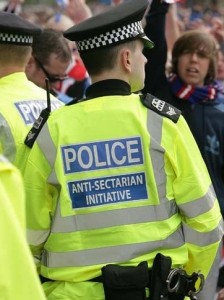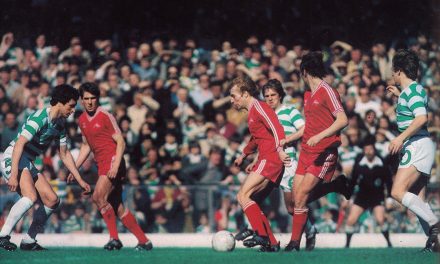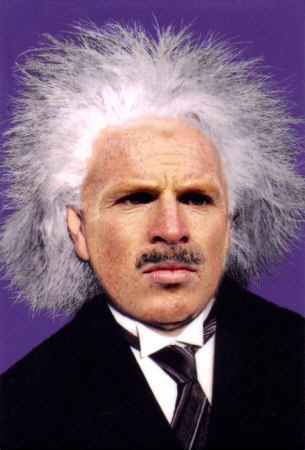I’ve never really understood why football has to pay such a high cost for police services. Firstly there is the question as to whether we need so many police at our games. Celtic v St Johnstone or Ross County, with the sub 100 traveling support, are hardly likely to be flashpoint fixtures yet there will be a police officer within yards of my seat. Just what is he waiting to deal with that a steward can’t? If it’s danger to opposing fans…If I can hit one of them with an object from my seat in the North Stand Upper I should be representing Scotland at the next Commonwealth Games, not getting arrested!
I joke to illustrate a point and I understand the benefits of some police presence and the limitations on what stewards can and can’t do, but the hefty police costs? Society decided over 100 years ago that football as a mass spectator sport would be a weekly recreational event, so why does football have to pay for it at all? Drivers aren’t stopped to pay an additional toll when traffic lights are out and an officer directs traffic so why do football clubs pay a premium for policing of this regular everyday event? But not only does football pay for this, but if things go wrong police take no responsibility.
In recent times, diddies taking flares into games have cost Celtic with UEFA fines. On each occasion I have wondered exactly what the club are paying police for. In any other business relationship, the service provider would be paying these fines on Celtic’s behalf for failing to provide the service expected. At football police wash hands of all responsibility and blame the fans.
One example of the hand washing was at the infamous “shame game.” There was no great incident to prompt the “shame” but the reporting led to the two clubs being hauled in front of the First Minister for a summit and PR photoshoot. At no point did I read anyone asking the famous question Archie asked at the 1980 Cup Final – Where Are The Police?!
Perhaps the most famous case of hand washing was that famous cup final. We have heard from Archie and Michael Kelly separately on Celtic Underground, both saying the same thing; that the police mucked up. The trouble in 1980 was caused by the fans but the police are there (and paid highly) to control the fans yet at that cup final they got their tactics completely wrong. Both Archie and Michael confirm that the bulk of the police were outside the ground, ready for potential trouble. In the recent Sportscene tribute programme Dougie Donnelly stated that there were only 13-14 police inside the ground at full-time. Other commentators (re-iterated by Michael Kelly) have mentioned the police overtime ban which (due to not anticipating extra time) meant many officers finished up at 90 minutes. Whatever the issue and whoever was most at fault among the fans the police, despite charging a hefty bill, escaped censure. Instead we had the introduction of the ban on alcohol at football, a ban which has lasted 30+yrs.
Were I to be paranoid or a conspiracy theorist I would suggest that police bodies are always looking for a bogeyman to ensure public sector cutbacks don’t affect the police. Football is an easy bogeyman due to the authorities failure to take control of the narrative and put forward the positive case for the game. I’m sure all would agree that modern stadia means spectating at games bears no resemblance to how we watched the game 30+ years ago and yet people like Les Grey of the Police Federation has kept football and its supporters as the great bogeyman. With stadiums being largely peaceful venues, the most recent stick the well-paid police service has used against our game has been domestic violence.
Violence of any type is to be abhorred and condemned and any action a civilized society can take to minimise should be encouraged however, it is laying the blame for this violence solely at football’s (and Celtic & Old Rangers) door that I have an issue with. I am not going to stray into an area I have limited knowledge of so I will provide quotes below from –
- Damien J. Williams (Lecturer in Public Health Sciences in the School of Medicine at the University of St. Andrews)
- Fergus G. Neville (Research Fellow in the School of Medicine at the University of St. Andrews)
- Kirsty House (Medical student at the University of Cambridge)
- Peter D. Donnelly (Professor of Public Health Medicine in the School of Medicine at the University of St. Andrews)
Reliable prevalence rates for domestic violence are notoriously difficult to obtain with systematic underreporting by victims and political denial often contributing to spuriously low figures. However, the Scottish Government acknowledges that domestic abuse is at an unacceptable level and recent statistics indicate a year-on-year increase in incidents of domestic abuse reported to the police between 2002 and 2003 (35,877) and 2011 and 2012 (59,847).
There is evidence of a link between sporting events and increased levels of domestic violence in wider society (due to) the “holy trinity” of sports, alcohol, and hegemonic masculinity in the context of domestic violence. Sporting events are commonly associated with excessive alcohol consumption. In addition, televised sporting events may exacerbate the problem by promoting the expression of masculinity and alcohol consumption (either unrestricted at home, or in licensed premises where there are fewer constraints than at sporting venues among a large number of individuals.
Recent media reports have documented an apparent increase in the number of domestic incidents reported to Strathclyde Police each time the two biggest football (soccer) clubs in Scotland, Glasgow Rangers and Celtic play one another.
There are a number of limitations in the analyses described in these media reports. First, figures for individual Old Firm matches are generated for the whole weekend or the day after the match. These are then crudely compared with those of an “average” weekend or an individual day after the match with the same day the previous week. Both these approaches are limited due to insufficient data points, and the former is also potentially confounded due to seasonality effects evident in trends of domestic violence.
In summary, people, predicated to be violent, have a problem when allowed to consume a load of alcohol and then there is an event that raises their emotions (no shit Sherlock) and more research needs done to say that it was a specific problem with Celtic v Rangers games.
I am not trying to demean the research here but what this says to me is that Scotland has a domestic violence problem. The figures are on the increase and there are 3 main trigger problems. IF there is an increase in domestic violence it was not the game’s fault. This is a societal problem. That game was merely the trigger. The other aspect I see from the report? After the “shame game”, if there was going to be legislation it should have been policing alcohol intake and football coverage at pubs.
The police do an essential job. If I see a guy trying to rob my house, I’d love a policeman to be walking around the corner. If trouble breaks out a game, I WANT the police there and to be fair to Police Scotland, having travelled Europe following the hoops I would feel safest and any incidents to be best-managed by our police HOWEVER…
Celtic have one of the highest policing bills in the UK and the underlying tone towards our game is of fans who are the cusp of violence. The environment at football is so different to the hey day of the 1970’s & 80’s hooliganism as to be unrecognisable and yet, because football does not control its own narrative, football and its fans are used as the bogeyman to ensure police budget cuts are minimised.
Football is a wonderful part of everyday Scottish life, a great economic driver for leisure and tourism and as an integral part of society for 100 years. Is it not time it stopped paying the bill to be part of society, stopped being used as the bogeyman and start being appreciated?





